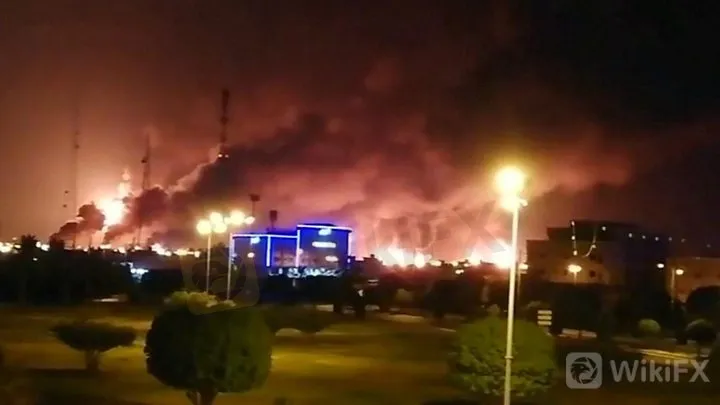简体中文
繁體中文
English
Pусский
日本語
ภาษาไทย
Tiếng Việt
Bahasa Indonesia
Español
हिन्दी
Filippiiniläinen
Français
Deutsch
Português
Türkçe
한국어
العربية
Oil prices soar after attacks on Saudi facilities
Abstract:Image copyrightReutersImage caption Smoke is seen following a fire at Aramco facility in the eastern
Smoke is seen following a fire at Aramco facility in the eastern city of Abqaiq
Oil prices hit their highest in four months after two attacks on Saudi Arabian facilities on Saturday knocked out more than 5% of global supply.
At the start of trading, Brent crude jumped 19% to $71.95 a barrel, while the other major benchmark, West Texas Intermediate, rose 15% to $63.34.
Prices eased back slightly after US President Donald Trump authorised the release of US reserves.
It could take weeks before the Saudi facilities are fully back on line.
State oil giant Saudi Aramco said the attack cut output by 5.7 million barrels per day, at a time when Aramco is trying to ready itself for what is expected to be the world's largest stock market listing.
The drone attacks on plants in the heartland of Saudi Arabia's oil industry included hitting the world's biggest petroleum-processing facility. The US has blamed Iran.
“Saudi authorities have claimed to control the fires, but this falls far short of extinguishing them,” said Abhishek Kumar, head of analytics at Interfax Energy in London. “The damage to facilities at Abqaiq and Khurais appears to be extensive, and it may be weeks before oil supplies are normalised.”
Saudi Arabia is expected to tap into reserves so that exports can continue as normal this week.
However, Michael Tran, managing director of energy strategy at RBC Capital Markets in New York, said: “Even if the outage normalises quickly, the threat of sidelining nearly 6% of global oil production is no longer a hypothetical, a black swan or a fat tail. Welcome back, risk premium.”

Iran accused the US of “deceit” after US Secretary of State Mike Pompeo said Tehran was behind the attacks. Mr Pompeo rejected claims by Yemen's Iran-backed Houthi rebels that they had carried out the attacks.
Iran's Foreign Minister Javad Zarif said that “blaming Iran won't end the disaster” in Yemen.
Riyadh has accused Iran of being behind previous attacks on oil-pumping stations and the Shaybah oil field, charges that Tehran denies. However, Saudi Arabia has not yet blamed any party for Saturday's strike.
Disclaimer:
The views in this article only represent the author's personal views, and do not constitute investment advice on this platform. This platform does not guarantee the accuracy, completeness and timeliness of the information in the article, and will not be liable for any loss caused by the use of or reliance on the information in the article.
WikiFX Broker
Latest News
The Withdrawal Trap: How Scam Brokers Lure Victims into Paying More
FCA to Investors: Think Twice Before Trusting These Brokers
Trump\s tariffs: How could they affect the UK and your money
Trump gambles it all on global tariffs he\s wanted for decades
TradingView Brings Live Market Charts to Telegram Users with New Mini App
Trump tariffs: How will India navigate a world on the brink of a trade war?
Interactive Brokers Launches Forecast Contracts in Canada for Market Predictions
Authorities Alert: MAS Impersonation Scam Hits Singapore
Stocks fall again as Trump tariff jitters continue
IG Group Acquires Freetrade for £160M to Expand UK Investment Market
Currency Calculator







